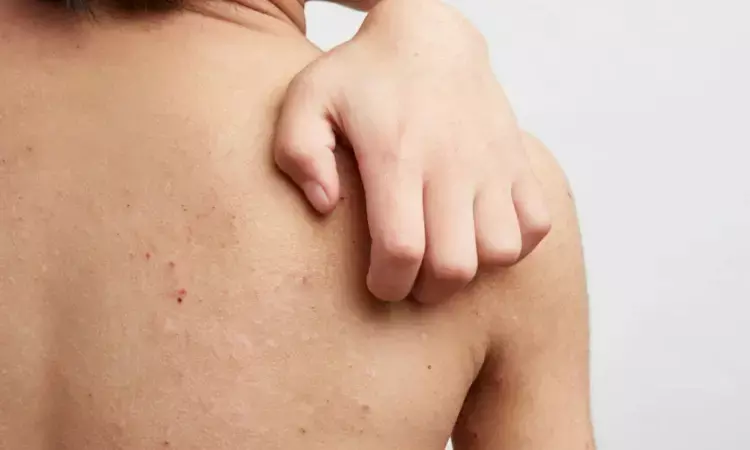- Home
- Medical news & Guidelines
- Anesthesiology
- Cardiology and CTVS
- Critical Care
- Dentistry
- Dermatology
- Diabetes and Endocrinology
- ENT
- Gastroenterology
- Medicine
- Nephrology
- Neurology
- Obstretics-Gynaecology
- Oncology
- Ophthalmology
- Orthopaedics
- Pediatrics-Neonatology
- Psychiatry
- Pulmonology
- Radiology
- Surgery
- Urology
- Laboratory Medicine
- Diet
- Nursing
- Paramedical
- Physiotherapy
- Health news
- Fact Check
- Bone Health Fact Check
- Brain Health Fact Check
- Cancer Related Fact Check
- Child Care Fact Check
- Dental and oral health fact check
- Diabetes and metabolic health fact check
- Diet and Nutrition Fact Check
- Eye and ENT Care Fact Check
- Fitness fact check
- Gut health fact check
- Heart health fact check
- Kidney health fact check
- Medical education fact check
- Men's health fact check
- Respiratory fact check
- Skin and hair care fact check
- Vaccine and Immunization fact check
- Women's health fact check
- AYUSH
- State News
- Andaman and Nicobar Islands
- Andhra Pradesh
- Arunachal Pradesh
- Assam
- Bihar
- Chandigarh
- Chattisgarh
- Dadra and Nagar Haveli
- Daman and Diu
- Delhi
- Goa
- Gujarat
- Haryana
- Himachal Pradesh
- Jammu & Kashmir
- Jharkhand
- Karnataka
- Kerala
- Ladakh
- Lakshadweep
- Madhya Pradesh
- Maharashtra
- Manipur
- Meghalaya
- Mizoram
- Nagaland
- Odisha
- Puducherry
- Punjab
- Rajasthan
- Sikkim
- Tamil Nadu
- Telangana
- Tripura
- Uttar Pradesh
- Uttrakhand
- West Bengal
- Medical Education
- Industry
Rilzabrutinib therapy in pemphigus patients shows effective outcomes in phase 2 trial

A recent phase 2 clinical trial found positive outcomes in patients with pemphigus a rare and potentially life-threatening autoimmune disease. The study focused on the use of rilzabrutinib which is an oral, reversible, covalent Bruton tyrosine kinase (BTK) inhibitor to manage pemphigus. The results of this clinical trial were published in the recent issue of Journal of Investigative Dermatology.
Pemphigus is a serious condition to treat and often require long-term therapy to control the symptoms and minimize the exposure to corticosteroids that can have significant side effects. However, this phase 2 trial demonstrated that rilzabrutinib could offer both rapid and sustained effectiveness with well-tolerated safety profiles in patients.
During the study period, adults who were of 18 to 80 years with moderate-to-severe pemphigus vulgaris/foliaceus (PV/PF) were randomized into two groups. One group received rilzabrutinib and the other group received a placebo. The participants in the rilzabrutinib group were administered 400 mg of the drug twice daily along with the corticosteroids at a dose of 0.5 mg/kg/d, over a period of 37 weeks.
The primary endpoint was to achieve a complete remission (CR), from week 29 to 37 with a reduced corticosteroid dose was not statistically significant. The secondary endpoints hinted at the potential benefits of rilzabrutinib therapy which included reduced corticosteroid usage, prolonged CR duration and a faster time to first CR.
The results of this study emphasized the well-tolerated nature of rilzabrutinib and the need to consider alternative analyses. A prespecified sensitivity analysis evaluated a minimal corticosteroid dose of ≤5 mg/d and included all observations and patients that provided encouraging results which supports BTK inhibition as a potential therapeutic strategy for pemphigus. While the primary endpoint did not reach the statistical significance using the traditional criteria but the sensitivity analysis highlighted the potential of rilzabrutinib in pemphigus management with reduced corticosteroid exposure.
The results of the phase 2 trial represent a significant step forward in pemphigus research and offer hope to patients grappling with this challenging autoimmune condition. Further research including the larger-scale trials and long-term follow-up are imperative that will help enhance crucial understanding of the efficacy and safety of rilzabrutinib in pemphigus management.
Reference:
Murrell, D. F., Caux, F., Patsatsi, A., Hagino, O., Rudnicka, L., Vassileva, S., Uzun, S., Ye, J., Yen, K., Arora, P., Gourlay, S. G., Joly, P., & Werth, V. P. (2024). Efficacy and Safety of Rilzabrutinib in Pemphigus: PEGASUS Phase 3 Randomized Study. In Journal of Investigative Dermatology. Elsevier BV. https://doi.org/10.1016/j.jid.2024.02.023
Neuroscience Masters graduate
Jacinthlyn Sylvia, a Neuroscience Master's graduate from Chennai has worked extensively in deciphering the neurobiology of cognition and motor control in aging. She also has spread-out exposure to Neurosurgery from her Bachelor’s. She is currently involved in active Neuro-Oncology research. She is an upcoming neuroscientist with a fiery passion for writing. Her news cover at Medical Dialogues feature recent discoveries and updates from the healthcare and biomedical research fields. She can be reached at editorial@medicaldialogues.in


